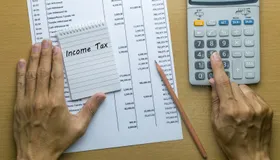Introduction
Owning a rental property can be a lucrative investment, providing a steady stream of income. However, along with the rental income comes the responsibility of managing taxes and ensuring compliance with the law. To navigate the complexities of rental property taxes, it’s essential to have a comprehensive understanding of how to calculate your rental income tax, available deductions, and overall tax obligations. In this article, we will explore the benefits of utilizing a rent income tax calculator to maximize your rental property returns and simplify your tax filing process.
Understanding Rental Income Tax Obligations
Rental income tax is the tax you pay on the income generated from your rental property. This income is subject to taxation, just like any other form of income. However, rental income tax involves specific rules and regulations that differentiate it from other types of income. To ensure compliance, it’s crucial to understand your tax obligations as a landlord.
Calculating Rental Income Tax
Calculating rental income tax can be a complex process, as it involves various factors. However, with the assistance of a rent income tax calculator, you can simplify the task significantly. Here’s a step-by-step breakdown of how the calculator can help you determine your rental income tax:
Enter Rental Income:
Begin by entering the total income you receive from renting out your property. This includes the rent payments from tenants.
Deduct Allowable Expenses:
Deduct the allowable expenses associated with your rental property. These may include property management fees, repairs and maintenance costs, insurance premiums, property taxes, and mortgage interest.
Calculate Net Rental Income:
Subtract the allowable expenses from your rental income to obtain your net rental income.
Apply Tax Rates:
Based on your net rental income and the tax rates applicable in your jurisdiction, the calculator determines your rental income tax liability.
Determine Deductions:
The calculator also identifies eligible deductions, such as depreciation, capital allowances, and interest on loans related to the property.
By using a rent income tax calculator, you can save time and ensure accurate calculations while maximizing your deductions and minimizing your tax liability.
Advantages of Utilizing a Rent Income Tax Calculator
Using a rent income tax calculator offers numerous advantages, enabling landlords to streamline their tax-related activities and make informed financial decisions. Here are some key benefits:
Accurate Calculation of Tax Liability
A rent income tax calculator ensures precise calculations of your tax liability by accounting for all relevant factors and considering the applicable tax rates. It minimizes the risk of errors and reduces the chances of overpaying or underpaying your taxes
Identification of Deductions
A rent income tax calculator helps identify deductions you may be eligible for, ensuring you take full advantage of tax-saving opportunities. By including allowable expenses and considering depreciation and capital allowances, the calculator maximizes your deductions, ultimately reducing your taxable rental income.
Efficient Financial Planning
By providing a clear breakdown of your rental income tax obligations, a rent income tax calculator empowers you to plan your finances more effectively. It allows you to estimate your tax liability and make informed decisions regarding rental property expenses, potential investments, and overall financial goals.
Frequently Asked Questions (FAQs) about rent income tax calculator
Q1: How can I determine my rental income tax without a calculator?
To determine your rental income tax without a calculator, you would need to manually calculate your total rental income, deduct allowable expenses, apply the relevant tax rates, and consider eligible deductions. However, using a rent income tax calculator significantly simplifies the process and minimizes the chances of errors.
Q2: Are there any specific deductions available for rental property owners?
Yes, there are several deductions available for rental property owners. These may include property management fees, repairs and maintenance costs, insurance premiums, property taxes, and mortgage interest. Additionally, you may be eligible for deductions related to depreciation, capital allowances, and interest on loans associated with your rental property.
Q3: Can I use a rent income tax calculator for multiple rental properties?
Absolutely! A rent income tax calculator is designed to accommodate multiple rental properties. Simply enter the income and expenses associated with each property, and the calculator will provide accurate calculations for your overall rental income tax liability.
Conclusion
Managing rental property taxes can be complex, but with the assistance of a rent income tax calculator, landlords can streamline the process and optimize their returns. By accurately calculating rental income tax, identifying deductions, and facilitating efficient financial planning, a rent income tax calculator becomes an invaluable tool for rental property owners. Stay informed, maximize your deductions, and ensure compliance with the law to make the most of your rental property investment. Utilize a rent income tax calculator today and take control of your rental property finances!







